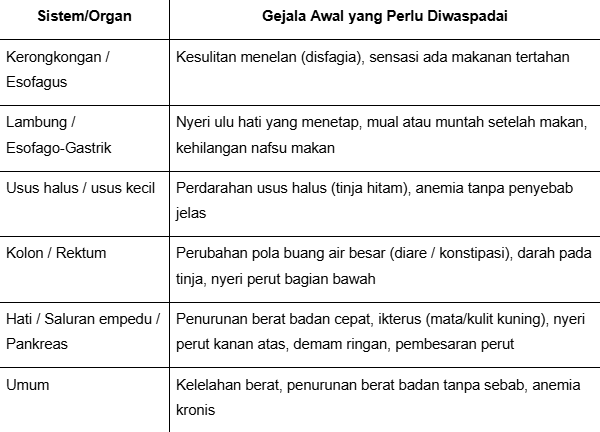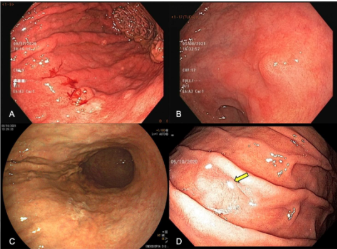By : Geraldus Sigap

Gastrointestinal cancer includes various types of cancers that affect the digestive tract, from the esophagus, stomach, small intestine, colon, and rectum, to supporting organs such as the liver, pancreas, and bile ducts. Although its prevalence is increasing, this disease often develops silently and is usually detected only at an advanced stage, when treatment becomes more challenging.
Why is Gastrointestinal Cancer “Unexpected”?
- Non-specific early symptoms
- Many patients dismiss complaints such as mild abdominal pain, changes in bowel habits, or a feeling of fullness after small meals—assuming them to be simple digestive disturbances.
- Hidden location and complex organs
- The digestive tract and related organs are located deep within the body cavity, allowing small tumors to grow significantly before causing noticeable symptoms.
- Latent risk factors
- Risk factors such as a high-fat, low-fiber diet, smoking, alcohol consumption, obesity, Helicobacter pylori infection, and family history increase susceptibility but are not always recognized as red flags.
- Lack of screening awareness
- Many people wait until symptoms appear or underestimate the importance of preventive screening, even though timely screening plays a major role in early detection.
Symptoms to Watch Out For
Here’s a summary of gastrointestinal cancer symptoms that are often overlooked:

Early Detection Strategies: Steps Not to Be Missed
- Regular screening according to age and risk factors
- Colonoscopy is recommended for individuals aged ≥ 50 years (or earlier if there are risk factors).
- For high-risk individuals (e.g., family history of colorectal cancer), screening should start earlier and be done more frequently.
- Endoscopy (EGD) for those with chronic stomach symptoms, reflux, or gastric bleeding.
- Diagnostic & therapeutic endoscopy
- Endoscopy / EGD to directly examine the upper GI tract (esophagus, stomach, duodenum)
- Colonoscopy to detect polyps or colon cancer
- Capsule endoscopy to examine the small intestine, which is difficult to reach
- ERCP to evaluate liver, pancreatic, and bile duct disorders
- Imaging and additional tests
- CT scan, MRI, ultrasound, or other radiologic examinations of the digestive system
- Liver function tests, pancreatic enzymes, and tumor markers (if cancer is suspected)
- Multidisciplinary approach to treatment
- The best management of gastrointestinal cancer involves collaboration across multiple specialties: gastroenterology, digestive surgery, interventional radiology, and oncology.

Figure 1. Pre-cancerous lesion findings on endoscopy
Benefits of Early Detection & Prognosis
- Higher treatment success rates
- Early-stage cancers are more likely to be removed surgically or treated with minimally invasive therapy, with better remission outcomes.
- Lower treatment costs and fewer complications
- Advanced stages often require combined therapies (major surgery, chemotherapy, radiotherapy), which are more complex and expensive.
- Better quality of life
- Early detection allows for lighter treatment, faster recovery, and a lower risk of recurrence.
- Prevention of severe complications
- Conditions such as gastrointestinal bleeding, bowel obstruction, or metastasis to other organs can be prevented or managed earlier.
Challenges & Barriers in Early Detection
- Lack of public awareness about gastrointestinal cancers
- Fear of endoscopy or colonoscopy procedures
- Costs and limited access to medical facilities
- Non-specific early symptoms
- Stigma or reluctance to seek medical help
Therefore, public education and accessible screening facilities are crucial.
Gastrointestinal Cancer Care at RS Abdi Waluyo
RS Abdi Waluyo provides comprehensive and specialized services for the diagnosis and management of digestive diseases and gastrointestinal cancers through the Rudolph Simadibrata Gastroentero-Hepatology & Endoscopy Center, supported by a multidisciplinary team of gastroenterologists, hepatologists, and digestive surgeons.
Available services include:
- Diagnostic and therapeutic colonoscopy (including polypectomy)
- Endoscopy (EGD) and capsule endoscopy
- ERCP (therapeutic and diagnostic for bile ducts/pancreas)
- Digestive tract imaging & MSCT colonography
- Digestive surgery (open or laparoscopic) through the Digestive Surgery team
If you or your family experience chronic digestive issues such as changes in bowel habits, unexplained abdominal pain, or blood in stools, do not ignore them. Regular digestive check-ups are essential, especially if you have risk factors for gastrointestinal cancer. Consult your concerns with the Gastroenterology & Digestive Surgery team at RS Abdi Waluyo at 021-3144989 or make an online appointment today.
FAQ
- What is gastrointestinal cancer?
Gastrointestinal cancer refers to malignancies that affect the digestive tract, from the esophagus, stomach, small intestine, colon, rectum, to supporting organs such as the liver, pancreas, and bile ducts. It often develops silently, leading to late diagnosis.
- What are the early symptoms of gastrointestinal cancer?
Symptoms vary by location but may include:
- Unexplained abdominal pain
- Changes in bowel habits (diarrhea/constipation)
- Blood in stool or vomiting blood
- If these symptoms persist, seek medical evaluation promptly.
- Who is at risk of gastrointestinal cancer?
Risk is higher in those with:
- Family history of digestive cancers
- High-fat, low-fiber diet
- Smoking or alcohol consumption
- Obesity and sedentary lifestyle
- Helicobacter pylori infection (for stomach cancer)
- Age over 50 years
- What tests can detect gastrointestinal cancer early?
Recommended tests include:
- Endoscopy (EGD) for stomach and esophagus
- Colonoscopy for colon polyps or cancer
- Capsule endoscopy for the small intestine
- ERCP for pancreas and bile ducts
- Imaging (CT scan, MRI, ultrasound) for detailed evaluation
- Can gastrointestinal cancer be prevented?
Not all cases can be prevented, but risk can be reduced by:
- Eating a high-fiber, low-fat diet
- Quitting smoking and reducing alcohol intake
- Maintaining a healthy weight
- Exercising regularly
- Undergoing screening as recommended by doctors
Resource :
- Menon G, El-Nakeep S, Babiker HM. Gastric Cancer. [Updated 2024 Oct 28]. In: StatPearls [Internet]. Treasure Island (FL): StatPearls Publishing; 2025 Jan-. Available from: https://www.ncbi.nlm.nih.gov/books/NBK459142/
- Jardim, S. R., de Souza, L. M. P., & de Souza, H. S. P. (2023). The Rise of Gastrointestinal Cancers as a Global Phenomenon: Unhealthy Behavior or Progress?. International journal of environmental research and public health, 20(4), 3640. https://doi.org/10.3390/ijerph20043640
- Martins, B. C., Moura, R. N., Kum, A. S. T., Matsubayashi, C. O., Marques, S. B., & Safatle-Ribeiro, A. V. (2023). Endoscopic Imaging for the Diagnosis of Neoplastic and Pre-Neoplastic Conditions of the Stomach. Cancers, 15(9), 2445
